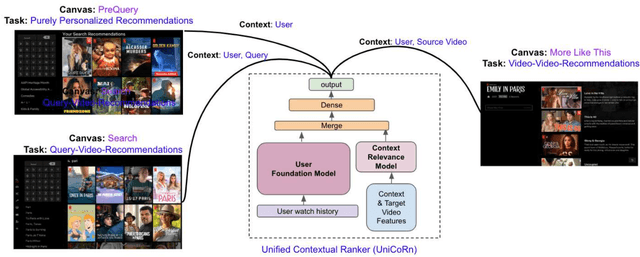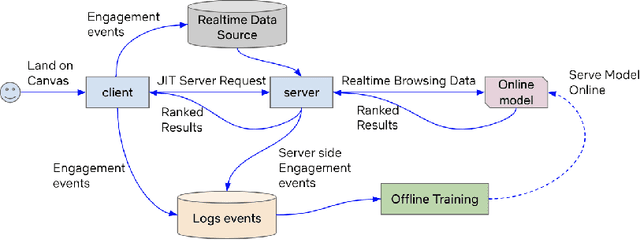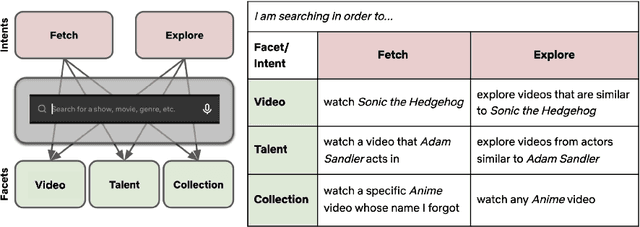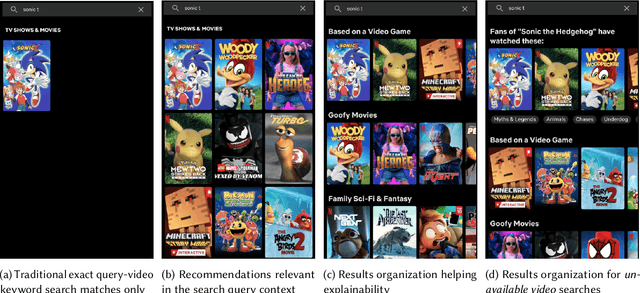Sudarshan Lamkhede
Joint Modeling of Search and Recommendations Via an Unified Contextual Recommender (UniCoRn)
Aug 19, 2024
Abstract:Search and recommendation systems are essential in many services, and they are often developed separately, leading to complex maintenance and technical debt. In this paper, we present a unified deep learning model that efficiently handles key aspects of both tasks.
Synergistic Signals: Exploiting Co-Engagement and Semantic Links via Graph Neural Networks
Dec 07, 2023



Abstract:Given a set of candidate entities (e.g. movie titles), the ability to identify similar entities is a core capability of many recommender systems. Most often this is achieved by collaborative filtering approaches, i.e. if users co-engage with a pair of entities frequently enough, the embeddings should be similar. However, relying on co-engagement data alone can result in lower-quality embeddings for new and unpopular entities. We study this problem in the context recommender systems at Netflix. We observe that there is abundant semantic information such as genre, content maturity level, themes, etc. that complements co-engagement signals and provides interpretability in similarity models. To learn entity similarities from both data sources holistically, we propose a novel graph-based approach called SemanticGNN. SemanticGNN models entities, semantic concepts, collaborative edges, and semantic edges within a large-scale knowledge graph and conducts representation learning over it. Our key technical contributions are twofold: (1) we develop a novel relation-aware attention graph neural network (GNN) to handle the imbalanced distribution of relation types in our graph; (2) to handle web-scale graph data that has millions of nodes and billions of edges, we develop a novel distributed graph training paradigm. The proposed model is successfully deployed within Netflix and empirical experiments indicate it yields up to 35% improvement in performance on similarity judgment tasks.
Augmenting Netflix Search with In-Session Adapted Recommendations
Jun 05, 2022

Abstract:We motivate the need for recommendation systems that can cater to the members in-the-moment intent by leveraging their interactions from the current session. We provide an overview of an end-to-end in-session adaptive recommendations system in the context of Netflix Search. We discuss the challenges and potential solutions when developing such a system at production scale.
Recommendations and Results Organization in Netflix Search
May 28, 2021

Abstract:Personalized recommendations on the Netflix Homepage are based on a user's viewing habits and the behavior of similar users. These recommendations, organized for efficient browsing, enable users to discover the next great video to watch and enjoy without additional input or an explicit expression of their intents or goals. The Netflix Search experience, on the other hand, allows users to take active control of discovering new videos by explicitly expressing their entertainment needs via search queries. In this talk, we discuss the importance of producing search results that go beyond traditional keyword-matches to effectively satisfy users' search needs in the Netflix entertainment setting. Motivated by users' various search intents, we highlight the necessity to improve Search by applying approaches that have historically powered the Homepage. Specifically, we discuss our approach to leverage recommendations in the context of Search and to effectively organize search results to provide a product experience that meaningfully adds value for our users.
 Add to Chrome
Add to Chrome Add to Firefox
Add to Firefox Add to Edge
Add to Edge